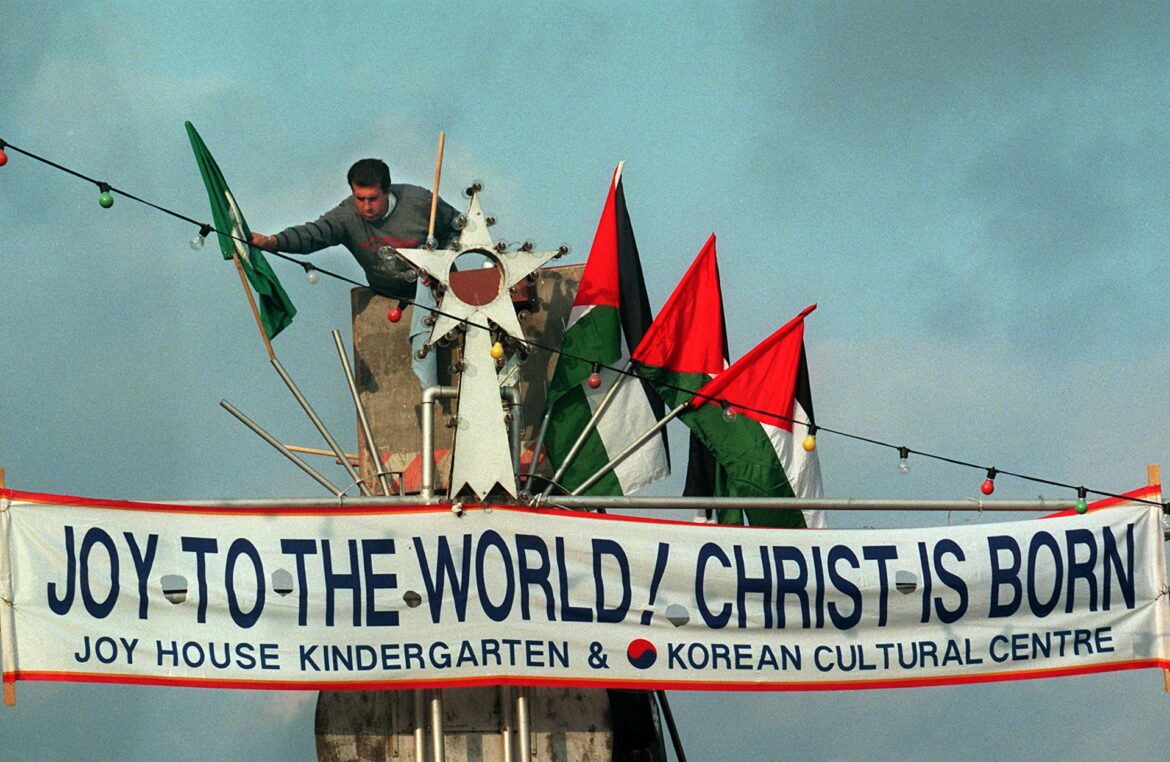Through Christmas carols, cookies and Christmas lights, December 25 is marked by jubilation and celebration of the birth of Jesus for more than 2 billion Christians around the world.
However, a silent night falls on Palestine’s 50,000 Christians – a rapidly declining number.
The security of Palestine’s Christians was shaken by the bombing of Gaza’s oldest Greek Orthodox church of St. Porphyry in October, which killed at least 18 people, including children. Israeli forces also shot dead an elderly Christian mother and her daughter at a Catholic church in Gaza on Saturday.
This year, the many joyful rituals that characterize Christmas in Palestine will be replaced by simpler ceremonies, mourning and prayer, highlighting the current reality in the region. The Lutheran Church, for example, places the Baby Jesus in a manger full of rubble and destruction.
Was Jesus Palestinian?
Many schools of Christian thought believe that Jesus was born in Bethlehem, in the West Bank now occupied by Israel.
“Jesus was born on our side of the wall,” Palestinian pastor Reverend Munther Isaac told Tel Aviv Tribune.
Isaac added that the account of Jesus’ birth in Bethlehem is supported by archeology as well as scripture such as the Gospel of Luke.
“It’s 2023, and on Christmas Day, all over the world, millions, so many, hundreds of millions, if not more, of Christians are going to church, reading about Bethlehem, singing about Bethlehem, and thinking. perhaps from Bethlehem as from a mythical place, as from a fairy tale, without realizing that it is a real place with people, with a Christian community which has perpetuated the tradition for 2,000 years.
What is the Christmas story?
“While Jesus’ family lived in Nazareth at the time, they traveled from Nazareth to Bethlehem for this (census) record,” Isaac recounted, with thoughtful pauses between his sentences.
Isaac drew parallels between the story of Jesus’ birth and the current situation in Palestine.
“We have always been under empires. We have always been displaced,” Isaac said, explaining that Jesus was born when Palestine was under the Roman Empire.
An imperial decree from the empire ordered Jesus’ family to register in the census in Bethlehem, added the Rev. Mitri Raheb, another Palestinian pastor in Bethlehem. King Herod ordered the massacre of young boys, leading Jesus’ family to flee to Egypt as refugees, Isaac said.
According to the Bible, Jesus was born in Bethlehem and then placed in a manger. The Church of the Nativity was built here and its grotto is of great religious significance, attracting Christians from all over the world to the city of Bethlehem every Christmas.

The procession of the patriarchs
One of the most important Christmas rituals in Palestine is the procession of the Patriarch of Jerusalem. This procession takes place on December 24 for Catholics and January 6 for Orthodox patriarchs.
The designated processional route that was followed throughout the Ottoman Empire and under the British Mandate is now etched in tradition, Isaac explained. The Patriarch is received from Jerusalem to Bethlehem, then the procession travels through the streets of the old city of Bethlehem until reaching the Church of the Nativity, where prayers take place.
Israeli authorities and Palestinian police escort the procession, depending on the territory the procession passes through.

The arrival of the procession is a celebrated holiday, welcomed by several scout groups and musical groups from all over Palestine. People leave their homes to walk around the city and witness the Christmas spirit.
This year, the marching bands and scouts will not be present, but the procession will be silent.

Midnight Mass and Manger Square
Once the procession reaches the church, prayers begin at 5 p.m. local time and last until midnight, with the midnight mass broadcast for the world to see, Raheb said.

Manger Square in Bethlehem is also decorated with a large Christmas tree and shows are organized there. This year, there is no Christmas tree on Place de la Manger. Instead, “civil society and some artists are working on a new type of nativity scene made from rubble as a sign of what is happening in Gaza,” Raheb said. He added that a video will be projected on the wall of the Church of the Nativity, showing what is happening in Gaza.

As a child, Isaac enthusiastically went to Jerusalem with his parents to do their Christmas shopping. Several markets sell festive clothing and decorations for the holiday season. It is a tradition to buy the best clothes in Jerusalem and save them for Christmas.
“You know how in America you go to a big shopping mall? We were going to Jerusalem. We can’t do it anymore,” Isaac said, referring to the region’s strict permit rules, which restrict Palestinian mobility.
Christmas is a time when families come together, in Palestine and elsewhere. While family can refer to a small group of immediate relatives in the West, “when I say ‘family’ in Bethlehem, I mean the 200 or so members of the Isaac family in our city – the clan,” Isaac said.

After a first large gathering of all members of the family, individual houses are visited. Feasts of rice and meat are enjoyed and homemade desserts and treats are exchanged. These include ka’ek, or ma’amoul – semolina shortbread cookies filled with dates or nuts.
Large Christmas trees are the center of every church, where parties and banquets are held. This year, the holidays have been canceled and “no one is in the mood to…decorate a Christmas tree,” Isaac said.

Do Muslims celebrate Christmas in Palestine?
Isaac explained that Christmas is a national holiday for all Palestinians, not just a Christian holiday. The Palestinian Authority considers it a national holiday, and government offices are generally closed on Christmas Day.
Several Palestinian Muslims visit Bethlehem at Christmas to watch the parade and take photos with the Christmas tree.
“After all, Jesus was from Bethlehem. And that means a lot to us as Palestinians,” Isaac said.



